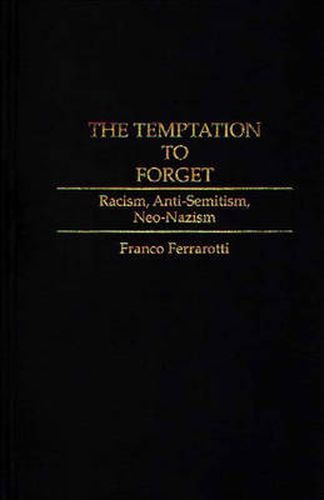Readings Newsletter
Become a Readings Member to make your shopping experience even easier.
Sign in or sign up for free!
You’re not far away from qualifying for FREE standard shipping within Australia
You’ve qualified for FREE standard shipping within Australia
The cart is loading…






We are nothing in an absolute sense. We are only what we have been-more exactly, what we remember we were. So begins the latest book by one of Europe’s most influential modern sociologists, Franco Ferrarotti. In The Temptation to Forget, Ferrarotti examines how many in the waning years of the 20th century are attempting to forget or reinvent history to serve the purposes of ethnic, racial, or religious separation.
Ferrarotti focuses on anti-Semitism and its re-emergence among the Skinheads of the 1980s to draw parallels to how the Holocaust has been reinterpreted/forgotten, and to analyze the implications of this for relations with other ethnic, racial, and religious minorities. Ethnic cleansing may be a new term, but, as Ferrarotti illustrates, it has a long heritage in thought and action. This book will make for provocative reading among professional sociologists and students of contemporary social issues.
$9.00 standard shipping within Australia
FREE standard shipping within Australia for orders over $100.00
Express & International shipping calculated at checkout
We are nothing in an absolute sense. We are only what we have been-more exactly, what we remember we were. So begins the latest book by one of Europe’s most influential modern sociologists, Franco Ferrarotti. In The Temptation to Forget, Ferrarotti examines how many in the waning years of the 20th century are attempting to forget or reinvent history to serve the purposes of ethnic, racial, or religious separation.
Ferrarotti focuses on anti-Semitism and its re-emergence among the Skinheads of the 1980s to draw parallels to how the Holocaust has been reinterpreted/forgotten, and to analyze the implications of this for relations with other ethnic, racial, and religious minorities. Ethnic cleansing may be a new term, but, as Ferrarotti illustrates, it has a long heritage in thought and action. This book will make for provocative reading among professional sociologists and students of contemporary social issues.